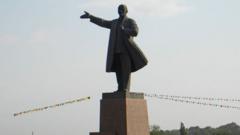Mark Rutte, NATO's Secretary-General, is advocating for member nations to raise military spending to a new benchmark of 5% of GDP as tensions with Russia escalate, highlighting the economic challenges that may arise from this.
NATO Calls for Increased Military Spending Amidst Rising Tensions

NATO Calls for Increased Military Spending Amidst Rising Tensions
NATO's Secretary-General urges member countries to significantly boost defense budgets in response to Russian aggression and US troop reductions.
In a bold move, NATO's Secretary-General Mark Rutte addressed the need for a transformative increase in collective defense spending during a speech in London. Rutte emphasized that member countries must drastically enhance their military budgets to address the growing threats from Russia and the diminishing presence of the United States in international defense efforts.
He called on NATO nations to commit to military expenditures at a level of 5 percent of their gross domestic product (GDP), a goal reminiscent of previous calls for spending by former President Trump, who argued that burden-sharing has long favored the United States. Rutte's recommendations come as NATO prepares for an upcoming summit in The Hague, set for June 24-25, where he hopes to solidify this ambitious new target.
Currently, the UK has pledged to increase its military budget to 2.5 percent of GDP by 2027 by reshuffling funds from international aid, while Prime Minister Keir Starmer has voiced aspirations for a 3 percent allocation over the next decade. However, exact timelines remain uncertain pending budget evaluations. Experts warn that scaling up to the 5 percent guideline would trigger significant political repercussions and trade-offs, especially given Britain’s already tense fiscal landscape.
Presently, the UK's defense spending stands at approximately 2.3 percent of GDP, outpacing France and Germany but still lagging behind the United States at about 3.4 percent. The path to achieving Rutte's ambitious target is fraught with economic considerations that will undoubtedly challenge the political will of many NATO members.




















